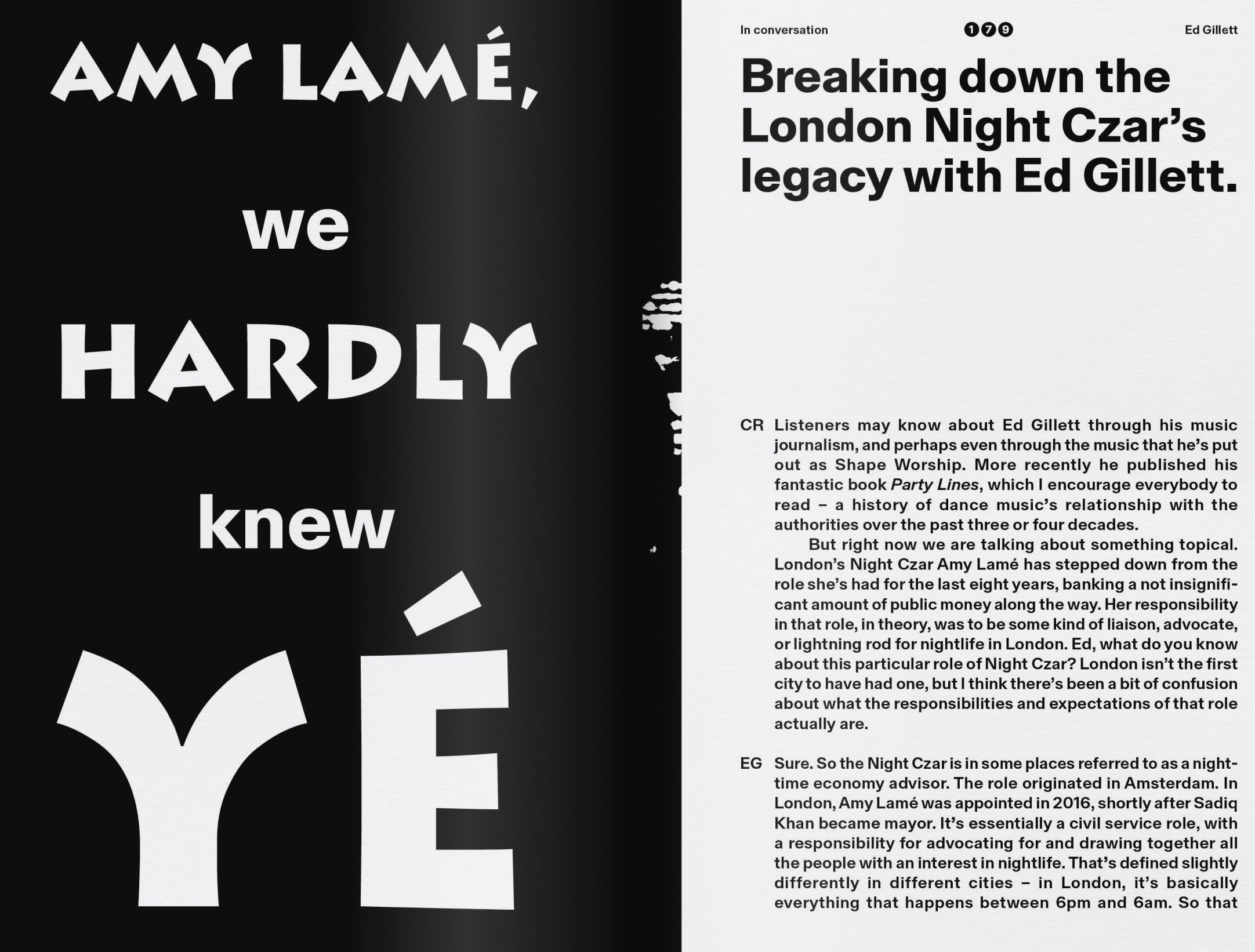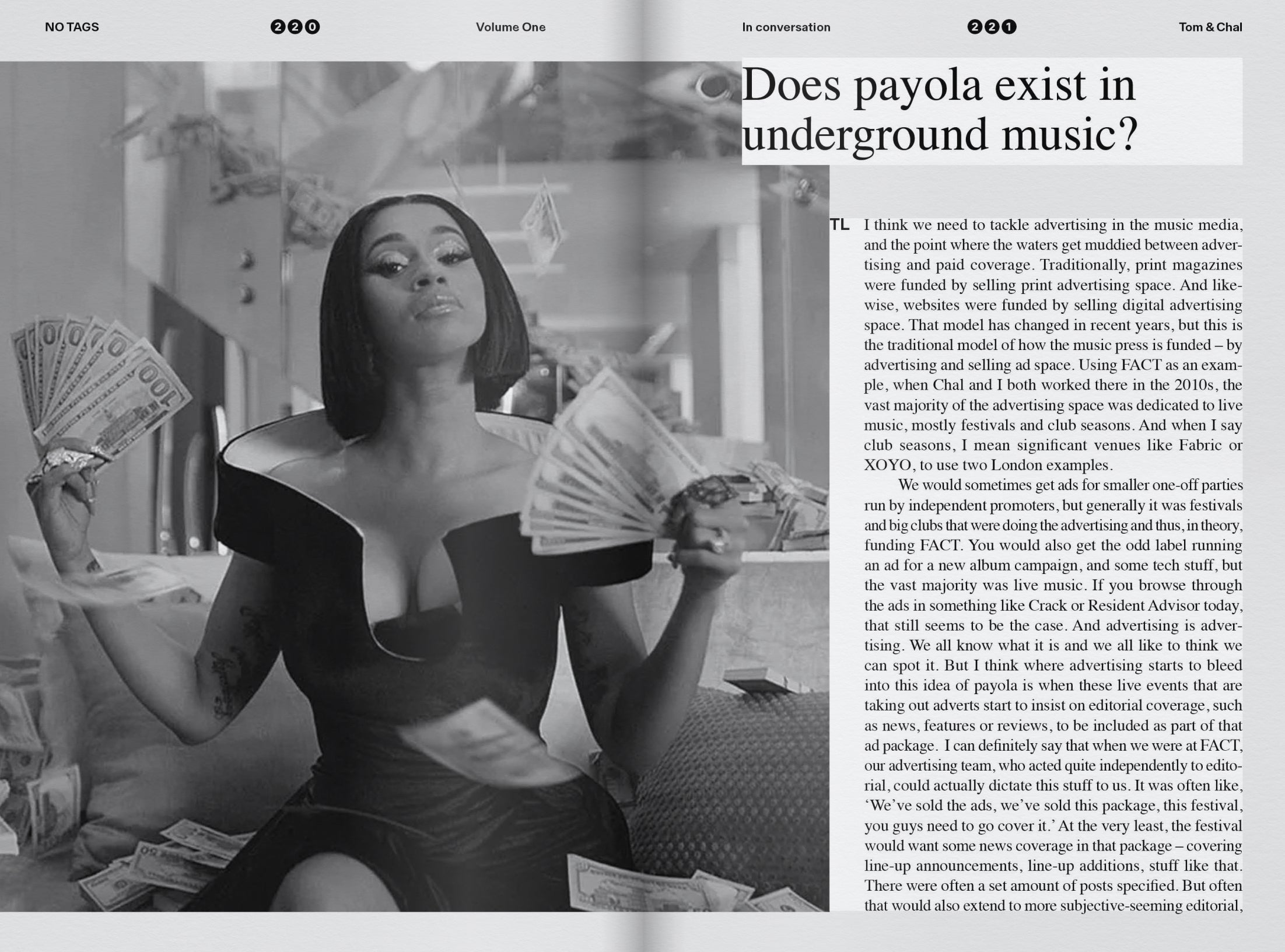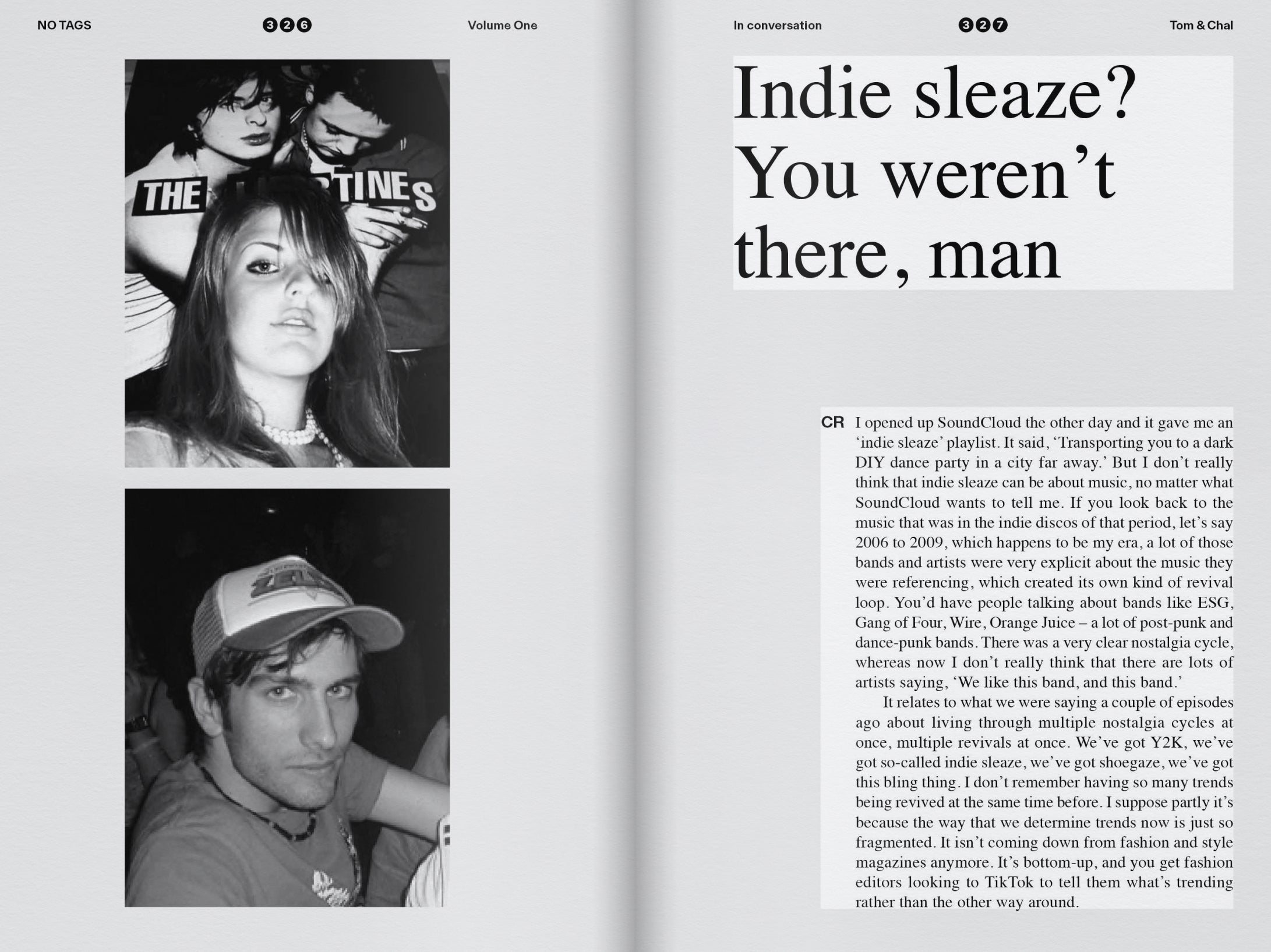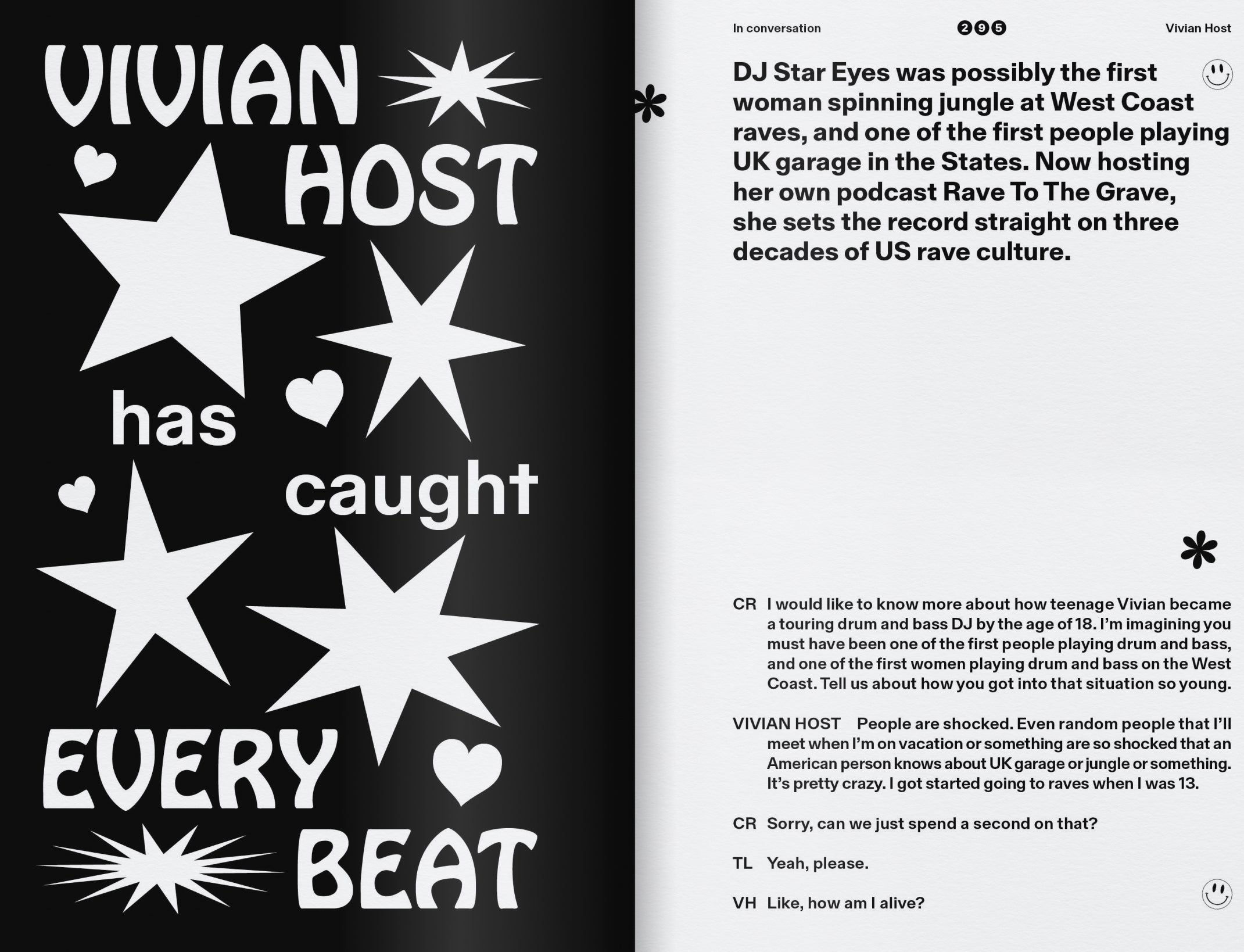
Spread from No Tags: Conversations on underground music culture
Author
Holly Connolly
Published
July 16, 2025
In a sense No Tags, the podcast and newsletter devoted to chronicling underground culture, started as a Whatsapp group; a space where Tom Lea and Chal Ravens could vent about the music industry, and music journalism, through the winter of 2022. Within the context of a rapidly shifting, increasingly sanitised, media landscape, and amid the collapse of certain social media platforms, some kind of endeavour that could facilitate these conversations for a wider audience began to feel important. And so No Tags was born: A broad, amorphous idea, initially envisioned as something that could evolve into whatever format felt most fitting.
Old friends who first met in the early 2010s, Lea and Ravens’ bond was cemented by a stint working together at Fact Magazine for several years across the mid-2010s. Between them they cover the spectrum of the industry: Ravens would go on to become one of the most respected music journalists of her era, as well as head of audio at Novara Media, while Lea launched an award-winning independent record label, Local Action. Most good podcasts tend to rely on the rapport between the show hosts, and Lea and Ravens share an easy camaraderie that makes No Tags an intimate, lively listen. But it’s probably their deep knowledge of music culture, and willingness to delve into topics that tend to get skipped over today by PR-dominated media, that makes it special.
Now, continuing in their initial spirit of letting No Tags evolve into new formats, they’ve brought out their first book. Designed by All Purpose Studio, it features a collection of some of their highlights from the first year, as well as four new, specially commissioned essays. Here Ravens and Lea discuss the impulse to make something physical, their frustrations with music media, and bringing people together.
We envisioned something that was quite fluid
Why did you decide to start the podcast?
Tom Lea: The way I remember it is, I spent the winter of 2022 in Sydney, in Australia, as my partner is Australian. Me, Chal, and another mutual friend called Finn, had this Whatsapp group, and we were spending a lot of time communicating in this group, essentially moaning about stuff that was annoying us in music discourse and music journalism. I also was spending a winter with quite a lot of time on my hands, so I was like, “Right, I'm going to start a thing. Be the change you want to see.”
Initially I wanted to start a DIY editorial platform of interviews. It wasn't going to be a podcast at all, it was going to be text-based. Then when I got back to London, me and Chal met up for coffee to start talking about it. Chal, in her infinite wisdom, said, “No, this should be a podcast. It makes much more sense as a podcast.”
Chal Ravens: Well, I remember it slightly differently. I think at first we were talking about it in a way that was a little bit roundabout, and to be honest I wasn't even sure if you meant for me to be involved in it. I was just pitching in, you know, “Oh maybe it should be this, maybe it should be that.”
I think, ultimately, what it came down to was that there wasn't a podcast similar to it, and that text-based music journalism was in a really funny place. We thought, ‘Let's make something that's a newsletter, and maybe we build a platform around it.’ Then it was like, “Well, if we're going to interview people anyway, and it's a Q and A format, we could just try a podcast, and see which one works.” I think we were a little bit open to the idea that if people weren't listening to the podcast, but everybody loved the newsletter and the transcriptions, then we would move towards that. But then people preferred the podcast, because people like to have things read to them.
TL: We envisioned something that was quite fluid, and it could go in whatever direction made the most sense. We talked about interviews, newsletters, commissioning essays for it (which obviously we then did end up doing as part of the book). It was kind of, I don’t want to say multi-format, but I think we viewed it as something that could go down various different paths.

Spread from No Tags: Conversations on underground music culture
A book is really efficient
And it has gone down various different paths in the end, because you've ended up having a podcast, and now a book too. What was your incentive to make a book?
TL: The book was also Chal’s idea. It was on the train journey back from the first No Tags Live, in Glasgow, when we kind of cemented it, planned it out, and started approaching people for essays.
CR: There are many benefits to a podcast conversation – it can encourage people to be a little bit off guard or informal, which is really useful. But to try to actually create something that is fulfilling our original mission, which is to chronicle underground music, we had to consider that ultimately a lot of podcasting is quite ephemeral, or not easy to look up or research.
Both of us have come from digital journalism, and we're keenly aware of digital media just falling off the internet. Whereas a book is a book is a book. Once you've made a book, there could be a point when it’s hard to find in the future, but books are still a pretty efficient way, I think, of having information to hand and enabling people to get hold of it. So really it was about the chronicling aspect being better served.
TL: I think we both had a bit of a desire to make something tangible as well. I bang on about the crumbling digital media landscape way too much on the podcast, but it’s like Chal says, a book is really efficient, whereas searching for specific media online can be really inefficient. Even if it’s a thing that only 1000 people own, I think we both had this desire to make something that's a bit more concrete, something that people can have and refer back to forever.
We have become aware of a network around what we do
Anecdotally, there's been a turn back towards print media. I wonder if, as well as the difficulty of finding things on the internet, it's also to do with the collapse of certain social media platforms like Twitter.
CR: Yeah, massively. We both spent loads of time on Twitter; I was on Twitter as early as 2009 and it was where I built my ‘career’. In many ways it was the place to become familiar with writers, thinkers, and characters, and to find your place in an ecosystem of writers or music people more broadly. That sense of, not so much a community, but a network, at least, it's really just gone. Something striking about No Tags has been, for me, really feeling like I'm more plugged in again. You get a few emails, old names and faces crawl out of the woodwork, people who are like, “We used to follow each other on Twitter.” It's hard to feel like you're in a network, but it is actually still there. It's just, as you say, I think the disappearance of Twitter has been really significant for niche interest groups, particularly with music.
TL: Twitter and Facebook too, right? Because Facebook groups were a big thing in that era. On a very simple level, if you go back say 12, 13 years, the two main channels of online communication are Twitter and Facebook. As Chal says, maybe ‘community’ is pushing it, but you get these networks that really thrive on those platforms. A big feature of these platforms is that you can actually link out to stuff, and so they became vital for sharing information. That’s not to say that you can't share information on Instagram and TikTok, you obviously can, but it's done in a much more self-contained way. It's not so much about people communicating, sharing stuff, and building a thing together. It's very much one person, speaking outwards.
Since starting No Tags, we have become aware of a network around what we do. It does feel like, you can’t recreate Twitter, but on some small level it feels like it's bringing together some of those same people who we used to communicate with, which has been really rewarding.

Spread from No Tags: Conversations on underground music culture
There’s a freedom and an agency
You said part of the motivation to launch the podcast was your frustrations with existing music media, what specifically frustrates you in the current landscape?
TL: We both cut our teeth working at a music magazine from the early 2010s through to the mid to late 2010s, and I think it's a natural thing to look back and think, ‘Well, I would do this differently.’ I would say Chal and I are both really proud of what we did in that time. Whereas by this point, for various reasons (and it's obviously not necessarily the fault of the people who work at these magazines), I get a lot less out of [music media]. Most magazines now are propped up by creative agencies; Chal has spoken about this at length on the podcast, and the myriad issues that this model comes with. I understand the commercial reasons for these magazines having to take some of the decisions they take, and I'm sure that these are not the decisions that their editorial staff want to take a lot of the time. But I find it a pretty dire and frustrating landscape. When you start something which doesn't have any backing, there’s a freedom and an agency, and I think we both find that really appealing.
CR: All of that. Also, for me, by this point I've written for most of the places you could write for. What I've found really challenging, as a writer, is getting the possibility to really bed in my own voice. I haven't necessarily felt encouraged to have a specific voice and be opinionated. I don't know if that is partly because of a general tone of professionalisation that's come along, which I think is very post-Pitchfork thing, where there's a sense of authorial objectivity. That tone is very opposed to some of the mags that I grew up reading, like NME, which were very chaotic and opinionated. So I think there's a little bit of a professionalisation that has led to some minimising of individual voices. Also, if I'm honest, I wouldn't want to say that I faced any particular limitations based on my gender through my career, but I do feel that sometimes male writers get the space to be more opinionated, to digress more, to say things that are beyond the pale. Whereas I often feel that I've been edited towards a tidier version of myself.
With the podcasts I get to be very much myself, because the point of the podcast is that me and Tom know each other very well, and we can have a conversation that feels really relaxed. So I think it was partly wanting to create a space where we could have an informal conversation that was also serious, to be able to talk about the media system that we're in while being outside of it. You can't say those things when you're writing for an existing publication, there’s a sort of omertà about a lot of that stuff.

Spread from No Tags: Conversations on underground music culture
Has the audience for the podcast surprised you?
CR: Well, it's definitely a lot of people who we know, which sounds maybe a bit small fry, right? Perhaps you would hope to reach an audience of people who don't know who you are. But actually, what's been really nice is the feeling that you're almost rebuilding a network that you already knew existed. A lot of people who listen are in some way affiliated with the music industry; people who work at labels and people who are musicians themselves. On an anecdotal level though, when I’m out and about, people will mention it to me, or I’ll be introduced, “This is Chal, she does the podcast.” It’s got a word of mouth feel, which is really, really nice. I mean I guess that’s how podcasts are, they’re very hard to plug, and you can’t just put them on social media.





